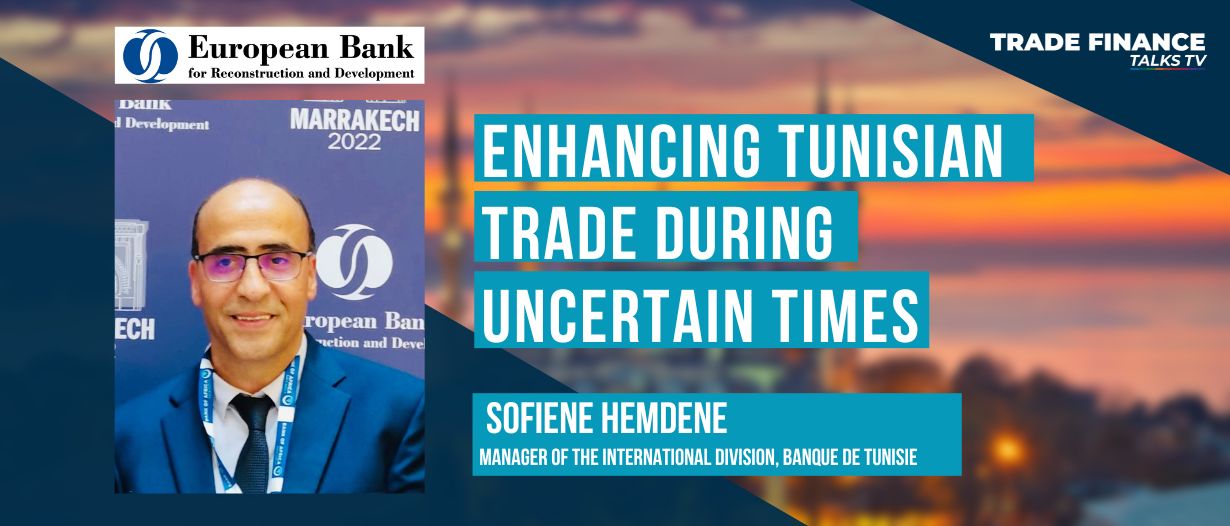Estimated reading time: 4 minutes
TFG spoke to a Tunisian banker at EBRD 2022 about the state of play in Tunisia and why the Russia-Ukraine conflict has so severely impacted the country economically.
Tunisia has not had it easy over the last decade.
First, there was the revolution of 2011, leading to political challenges. Then came the COVID-19 pandemic of 2020, devastating the local tourism industry and leaving many Tunisians poverty-stricken and unemployed.
This was followed in close succession by inflation spikes, along with food and energy shortages in the wake of supply chain disruptions and the Russia-Ukraine war.
The result has been a severe and prolonged economic crisis, leading to food and energy insecurity and a widening trade deficit.
To help the country mitigate the impact of the Russia-Ukraine conflict on food and energy security, the World Bank granted Tunisia a $130 million development loan in June, on the proviso that the government make some much-needed reforms. This includes changes to the current food subsidy system.
At EBRD 2022, TFG spoke to Sofiene Hemdene, manager of the international division at the Banque de Tunisie, one of Tunisia’s oldest commercial banks, about the state of trade finance in Tunisia. The discussion circled how banks have managed to weather the political and economic storms of recent years.
Hemdene said, “Unfortunately, the last few years have been very, very hard for Tunisia. [But] since we adopted the IMF rescue program, things are moving in a better direction.
“The big challenge for us was to enhance trade and business. We are well-known for our exports in the agricultural [phosphates] and agri-food [olive oil and dates] industries, as well as services [tourism].
“Unfortunately, Tunisia also has a widening trade gap––which is essentially a structural deficit. This is due mainly to the country’s high dependence on energy products––fuel––which represents more or less 40% of all our imports.
“Secondly, it is also being affected by the current trends in commodities: we are the third largest importer of soft wheat in the world. As a result, Tunisia is still far away from ensuring food security.”
Having spent 25 years in the trading division of the bank, Hemdene understands only too well the country’s vulnerability to external factors such as geopolitical divisions and macroeconomic trends and how these can heavily impact Tunisia’s ability to function.
Tunisia has been heavily affected by the Russia-Ukraine conflict, which Hemdene believes has propelled the country into its most severe crisis since its independence in 1956.
Being a desert region, Tunisia is heavily dependent on foreign imports like fertilisers, energy, and foodstuffs like sugar and wheat (Tunisia is the third largest importer of soft wheat in the world), for basic survival.
Many of these used to come from Russia and Ukraine.
Without these basic commodities, many of the country’s industries, including the production of textiles and car parts, cannot function.
The result has been sudden and severe spikes in inflation, as well as shortages of food and medicines––a situation not aided by the country’s food subsidy system, which the World Bank believes, is exacerbating the problem and encouraging hoarding.
According to the summer 2022 edition of their Tunisia Economic report the Russia-Ukraine conflict has exacerbated the trade deficit, with it widening by 56% in the first six months of 2022, reaching 8.1%of gross domestic product (GDP)
Additionally, inflation rose from 6.7% in January 2022 to 8.1% in June 2022; and the budget deficit is forecast to reach 9.1% in 2022, compared to 7.4% in 2021.
Hemdene, however, is hopeful that things are now on the upturn.
Along with the IMF loan, Banque de Tunisie has also managed to secure and maintain a line of credit with the European Bank for Reconstruction and Development (EBRD), an organisation set up in 1991 by 71 countries after the Cold War to aid in the creation of a new economic era in central and eastern Europe for ‘market-oriented economies.’
As a result of this $100 million EBRD trade facilitation credit lifeline, set up in 2018, the Bank of Tunisia has been able to continue helping its business clients and offer trade finance guarantees to Tunisian exporters and importers, despite the current economic upheaval.
Hemdene added, “This loan facility has proved to be a major rescue for Bank of Tunisia in terms of sustaining and maintaining its relationship with our main clients––minimising disruption to their business activities.
“Also, the indirect effect of EBRD’s support [meant] we didn’t have the closing of accounts we might otherwise have faced, and we are still in relationships with the big foreign banks all over the world.”





























